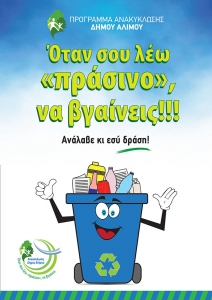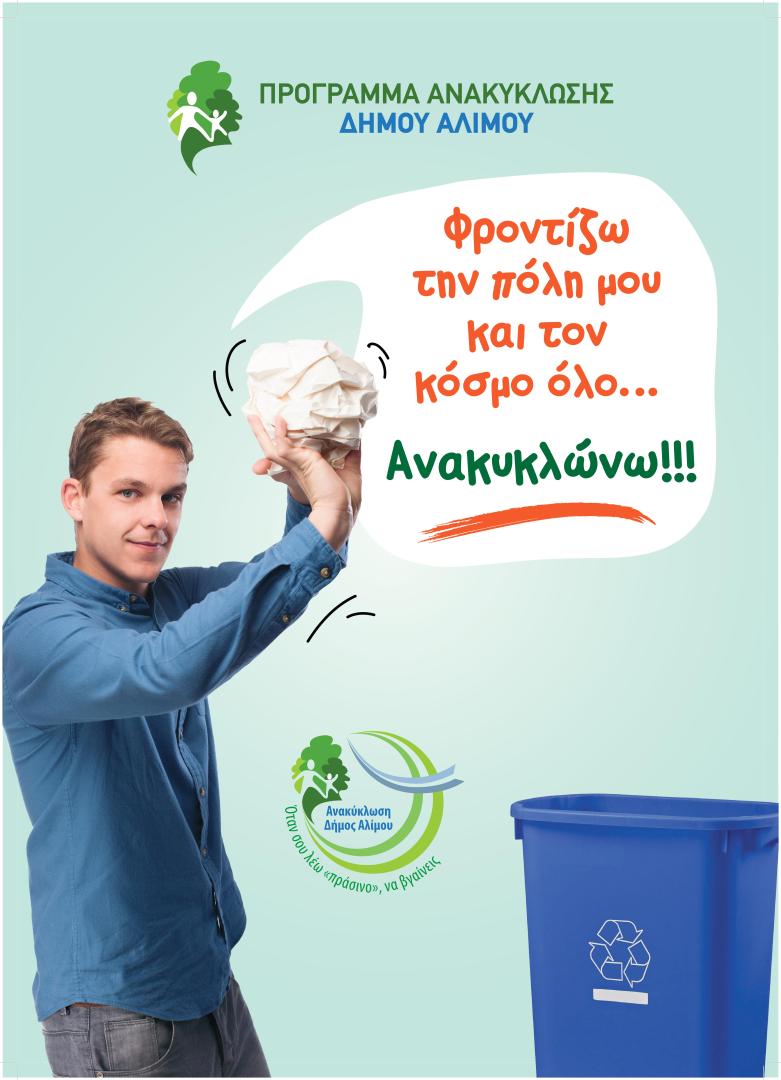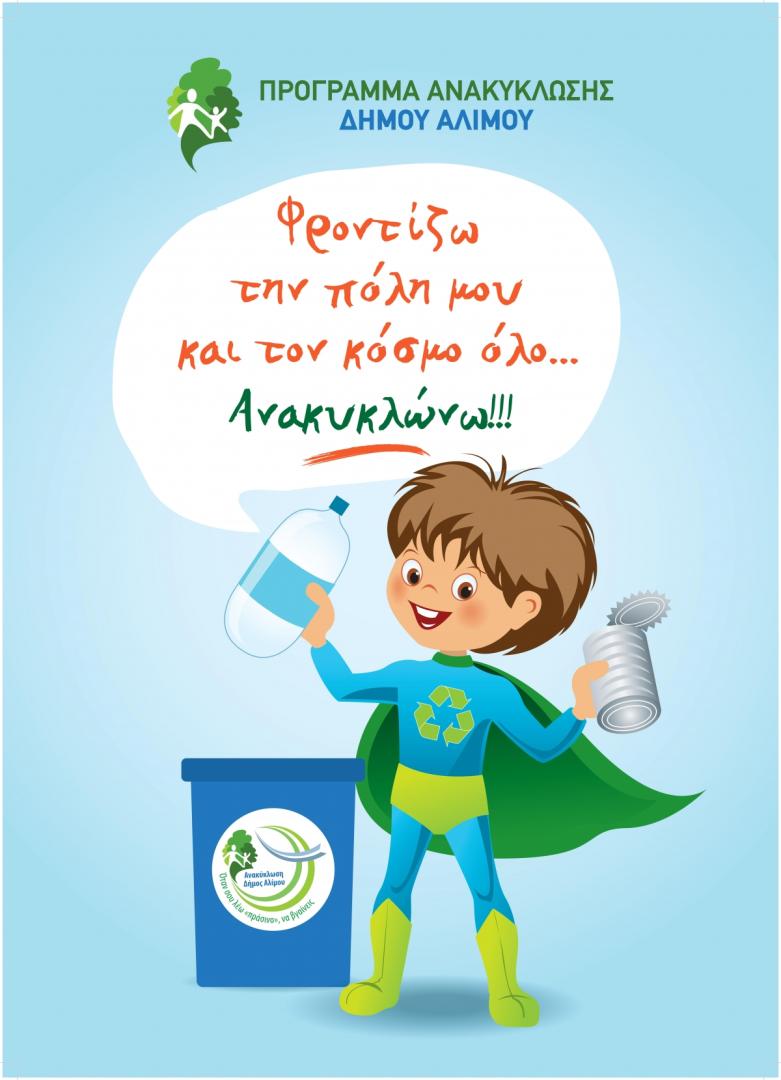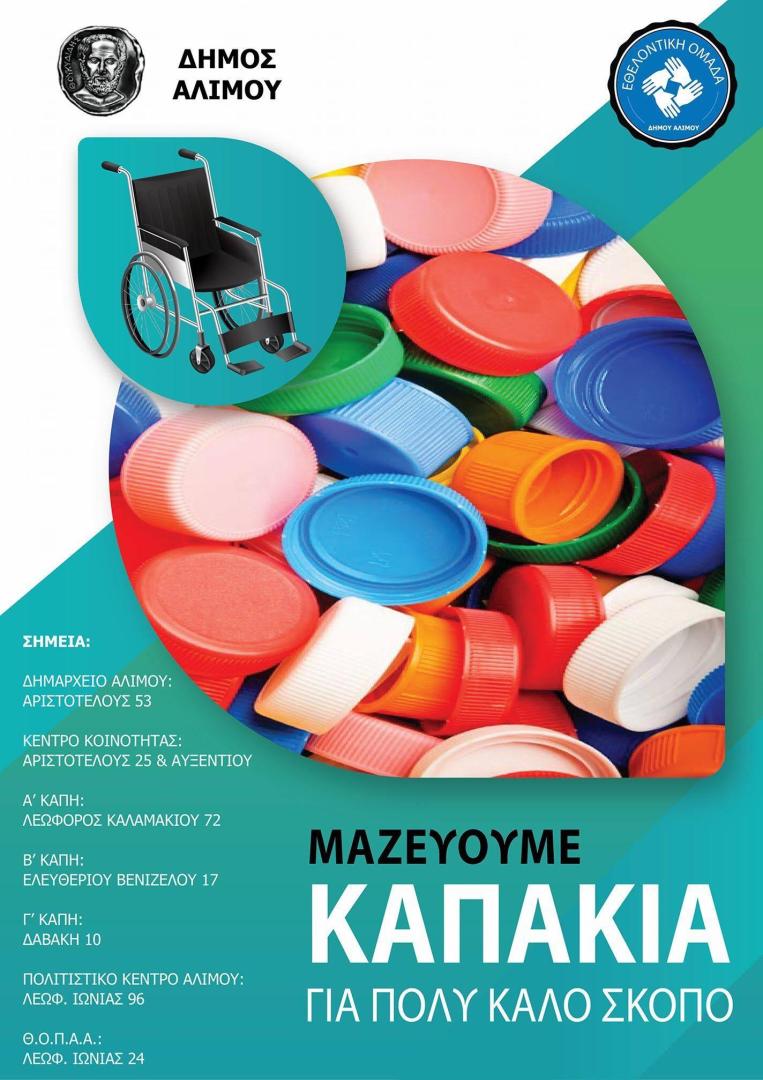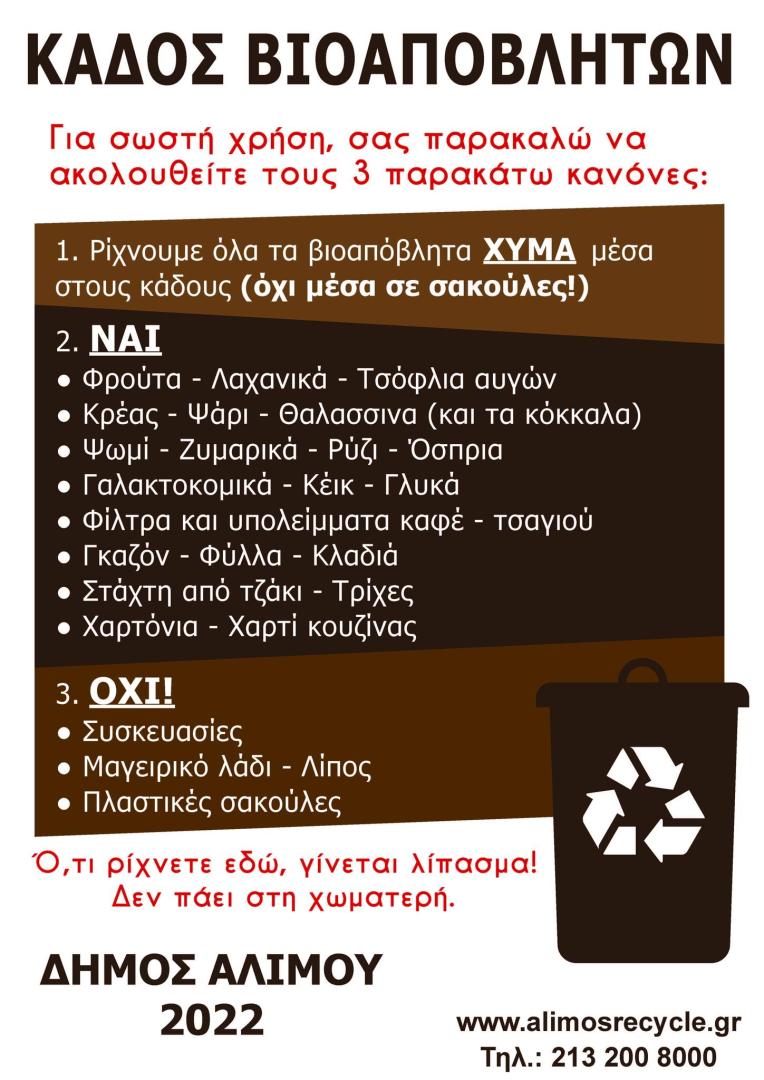When I tell you "green", go out !!!
Basic information
Project Title
Full project title
Category
Project Description
Recycling, proper waste management, is one of the main priorities for our Municipality. With the central goal of improving our daily lives, we are currently implementing a series of actions for the separate collection of municipal waste in collaboration with alternative management systems, individuals and organizations. We all work to improve the functionality of the city, reduce the cost of waste management and harmonize it with national and European legislation.
Geographical Scope
Project Region
Urban or rural issues
Physical or other transformations
EU Programme or fund
Which funds
Description of the project
Summary
The Municipality of Alimos is fully aware of recycling and in fact has created a separate website for recycling (http://www.alimosrecycle.gr/), which promotes the work of the Municipality in this area and in fact in separate fields of action depending on the if the person concerned is an ordinary resident, business or children / young person / s. Material management is recognized by European policy makers as a means of reducing the impact of waste and reducing the inflow of raw materials into the economy (Directive 2008/98 / EC). Many recycling initiatives have reached a point where existing product recycling methods and recovery technologies are available. However, there are basic waste streams and materials that need to be addressed further due to the difficulty (cost and complexity) of their recycling, their large volume and their carbon footprint. The initiatives of the Municipality stem from the view that waste management is not just a technical process. It does not depend only on the political will. But also from social attitudes and mentalities. From the personal choice of citizens and to be able to achieve this information is the key to the success of recycling programs. And of course the personal effort, the individual action, the active participation of each of us individually. Each group of citizens must be fully informed about: - What we recycle how and where? - What we should not throw in a specific recycling bin.- What happens to the materials once they have been collected. The new and unique added value of the project is the development of environmental policies and strategies for improved solid waste management and the implementation of a pilot value chain in the Alimos area.
Key objectives for sustainability
The main goal of the project, apart from raising awareness and informing the residents (http://www.alimosrecycle.gr/information/citizens/) but also the youth of our Municipality (http://www.alimosrecycle.gr/information/kids -youth /) and their active participation in such actions. However, the most important goal of the project is the mobilization of small and medium enterprises and small enterprises of the Municipality in circular actions (http://www.alimosrecycle.gr/information/business/), which are distinguished by a strong presence and innovative perspective in the context corporate responsibility and sustainable development. The actions of the Municipality aim at the companies of the area to treat the Circular Economy as a business strategy for this reason an attempt was made to record the circular activity of the companies in general, for this reason it focuses on the practices, implementation and operation departments, the level of specialization in the field of circular economy as well as possible measures to improve their strategy. As it turned out, a large part of companies apply the principles of Circular Economy. The Municipality to help each business sector to activate the Circular Economy emphasizing the lack of know-how and the difficulty of applying circular business models and circular products-services that are perhaps the most important internal obstacles in the transition of our country's business models to circular economy models Finally, cooperation with other industries, despite the fact that infrastructure is adequate and partners are suitable, is still a necessity for the circular economy.
Key objectives for aesthetics and quality
In the framework of its actions, our Municipality creates posters both to mobilize the citizens and to inform them about the results of the actions. It also creates commercials that are advertised and shown on national channels. (WE RECYCLE CORRECTLY !!). An example that proves the quality of experience is the action for the recycling of tires in 2016 6,869 used tires were collected from vehicles from five workshops - points of the Municipality of Alimos and were led to Recycling. The data were announced by ECOELASTICA SA, an approved body for the management of used tires, with which the Municipality of Alimos cooperates. With the rubble produced from recycled tires, rubber floors and modified asphalt are made, constructions that contribute to the prevention of accidents and to the improvement of the quality of life. (RECYCLING OF TIRES).
Key objectives for inclusion
Stakeholder approximation actions consist of the following pillars. The main means of communication and the source of transparency of the project will be the website of the Municipality, which will be accessible to others and people with disabilities, in two languages communications because we must not forget that our Municipality is also a tourist attraction, the which will be accessible from mobile devices anytime and anywhere. It will include a section for the dissemination of the progress and the main results of the project, as well as a section for communication between the companies of the Municipality, which participate in the implementation of the project, but also the points that can be recycled by its citizens and businesses. In addition, social media accounts will be created to make the project known to a wider audience. To present the achievements of the project to the international public, with technical data, statistics, benchmarks and answers to common questions, always referring to the progress of the project and the dissemination of project innovations in the business and academic communities. Communicate the achievements of the project to various stakeholders and produce common messages about the value of the project. This strategy will guide collaboration for project development and dissemination of information about its contribution, both nationally and at a common / transnational level. Specifically, targeted dissemination material will be produced in print and electronic form, to disseminate the approach, methodology and results to a wide range of stakeholders, researchers, politicians and decision makers, and the private sector. Finally, the Municipality of Alimos will organize information events.
Results in relation to category
The results of the project of the Municipality show that for 2021 the quantities of recycling per category are the following: 19 tons of paper, 102 tons of clothes, 48 kg of electrical appliances 1,268 tons of branches, 503 tons of recyclable materials in coffee bins, 1,043 tons of recyclable materials in blue bins, 833 tons of rubble, 13 tons of bulky items, 16 tons of glass. As it results from official results, the actions of the Municipality in recycling reward its work, for example that Alimos is one of the first Municipalities that started the recycling of clothes, shoes, fabrics and other materials, installing the red bins in several parts of the city. , following a proposal by the Union of Old Scouts, through this action in 2020 the Municipality of Alimos achieved another success and was in the top five Municipalities, with the largest recycling of clothes! Thanks to the participation of all Alimiotes, Alimos came 4th among all the Municipalities, even compared to cities with much larger populations, such as the capital (Municipality of Athens). An important help for the implementation of the objectives of the Municipality is the action THE GREEN CITY, it is the Citizens Recycling Award Program of the Attica Region and EDSNA (ATTICA Solid Waste Management Agency), in which the Municipality of Alimos participates in the effort for more recycling and a cleaner environment. A specially equipped van type vehicle becomes a Mobile Green Point and is parked in the neighborhoods. Citizens deliver the items to be recycled there and earn points that provide them with cheaper purchases. Residents have the opportunity to recycle the separated materials of many categories (Paper / Cardboard, Plastics, Metal Objects, Aluminum, Glass, Electronic / Electrical Equipment, Edible Oils and Fats, as well as Clothes / Fabrics) and to collect.
How Citizens benefit
The Municipality of Alimos through an organized campaign with actions, posters, spots, events funded even by European programs, through its site and social media promotes and promotes its work. Also, the Mayor of Alimos found valuable helpers and supporters in the faces of kindergarten teachers, teachers and professors, after an interesting and useful dialogue, where suggestions and remarks were mentioned, Mayor and teachers joined hands, in order to achieve information and awareness. of Alimos on the issues of recycling and environmental protection. With the basic motto "I take care of my city and the world… I recycle" and with appropriate material (posters, newsletter, mousepad, presentations, questionnaires, etc.) the Municipality of Alimos tries with the help of the educational community to encourage the participation of students in Recycling. Teachers can make their own unique contribution to passing on environmental awareness to children, raising the awareness of infants, children and adolescents about recycling and protecting the environment. It is very important to address young people, as at a young age good habits are formed and consolidated, environmental awareness, responsibility and respect for the environment are cultivated. Raising young people's awareness of recycling is the cornerstone of creating a society that recognizes its own role and participates consciously and actively in solving problems related to the environment and the future of the planet.The results of the project of the Municipality show that for 2021 the quantities of recycling per category are the following: 19 tons of paper, 102 tons of clothes, 48 kg of electrical appliances 1,268 tons of branches, 503 tons of recyclable materials in coffee bins, 1,043 tons of recyclable materials in blue bins, 833 tons of rubble, 13 tons of bulky items, 16 tons of glass.
Physical or other transformations
Innovative character
zation. In this way they reduce or even eliminate losses, discard non-renewable sources as raw material, focus as much as possible on the use of secondary materials, renewable or sustainable supplies and non-toxic materials, for easy disassembly, repair and maintenance . maintenance, renewal and re-entry into the value chain. Through these processes, the way of creating, delivering and committing value is redefined in a completely different way from that of linear products. The way of production changes and, there is a need for new support partners that serve the circular structures and activities and finally there is two-way communication even after the sale or use of the product / service.
These new cyclical business models based on either innovative solutions in new technologies or depending on the strategic management of the resources they choose to follow (closing or slowing down the material and production flow cycles) can perform a clear strategy. Understanding the position of the company in the value network also plays an important role here as each category, depending on where it is located, faces the corresponding cyclical challenges, eg, circular design models, optimal use models, value recovery models and cyclical support models. It would be best to have all possible forms of cooperation as through them it is possible to address the upcoming challenges and complete the circularity. It is finally becoming clear that the circular economy is now existing, feasible and is the future system of business and industrial organization.
Learning transferred to other parties
Recycling and proper waste management represent the lowest level of efficiency and value commitment. In addition, the collection of parts from returned products adds value when reused in a service channel for repair or reconstruction purposes instead of being dismantled to form the value of the raw material through recycling. The creation of a reverse supply chain for the return of resources could contribute significantly to this, so that there is a greater success rate of the cyclical business model. Most companies have a well-organized supply chain to deliver their products and services, but they do not have back-up supply chains that allow them to repair, renovate, or harvest valuable components and materials. One solution to the problem would be good cooperation and coordination of the reverse supply chain with the supply chain to create closed loops between companies. This is also one of the main desirable measures demonstrated by companies: Greater cooperation in the supply chain and greater cooperation with other industries. This could be achieved with reverse supply chains, which seem to be 'in short supply'. Therefore, the combination of external and internal auxiliary factors could significantly contribute to the transition to a Circular Economy, the development of new business models and the simultaneous resolution of many critical national issues. Finally, an important precondition for this perspective is the development of cooperative networks either between companies or between state and institutional mechanisms in order to facilitate the transition work and to consolidate the condition of the circular economy at the microeconomic and macroeconomic level. It finally becomes clear that the circular economy is now existing, feasible and is the future system of business and industrial organization.

